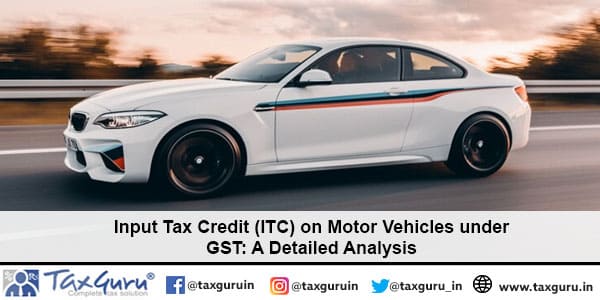Introduction
In the landscape of Goods and Services Tax (GST), Input Tax Credit (ITC) serves as a pivotal tool for businesses to alleviate their tax burdens. However, when it comes to motor vehicles, specific regulations dictate the eligibility and limitations of claiming ITC. Understanding these intricacies is vital for businesses seeking to optimize their tax liabilities.
In the Goods and Services Tax (GST) regime, claiming Input Tax Credit (ITC) on purchases made for business purposes plays a crucial role in reducing the overall tax burden. However, specific restrictions apply to claiming ITC on motor vehicles. This article delves into the eligibility of ITC on motor vehicles, with a particular focus on exceptions for vehicles exceeding 13 seating capacity and the scenario of renting motor vehicles.
Page Contents
Understanding ITC on Motor Vehicles
Section 17(5) of the Central Goods and Services Tax (CGST) Act, 2017, restricts ITC on certain supplies received by a registered taxpayer. One such restriction applies to motor vehicles used for the transportation of persons.
General Rule: ITC Ineligibility for Passenger Cars
As per the general rule, ITC is not available on motor vehicles with an approved seating capacity of less than or equal to 13 persons (including the driver). This encompasses most cars commonly used for business travel.
Exceptions for ITC Eligibility on Motor Vehicles
There are exceptions to the general rule, allowing ITC to be claimed on specific categories of motor vehicles:
- Vehicles exceeding 13 seating capacity: ITC is available for motor vehicles designed to carry more than 13 passengers (including the driver). This category typically includes buses used for public transportation or staff transportation by companies.

- Vehicles NOT exceeding 13 seating capacity:
- Vehicles used for supplying other vehicles: If a business is involved in the supply of vehicles (e.g., a car dealership), ITC can be claimed on motor vehicles used for that purpose, irrespective of their seating capacity.
- Vehicles used for transportation of goods: Businesses can claim ITC on motor vehicles primarily used for transporting goods in the course of their business. This includes trucks, tempos, and other goods carriers. ITC is also available on services like insurance, repair, and maintenance related to such vehicles.
- Vehicles used for Imparting motor driving or training skills:
- Businesses can claim ITC on motor vehicles primarily used for imparting motor driving or training skills in the course of their business. This includes buying a Car by Driving School for teaching driving skills and knowledge to its customers
- Vehicles used for transportation of Passenger: Businesses can claim ITC on motor vehicles primarily used for transporting passenger in the course of their business. This includes buying a Car and riding it for Ola/Uber, in such cases ITC on purchase of car is available if GST is charged on Outward supply to Ola/Uber or any Cab Aggregator. In recent times it will be difficult to claim ITC as such Cab Aggregators are covered u/s 9(5) wherein they are required to pay Pay GST on the supply.
Renting/Hiring/Leasing of Motor Vehicles and ITC
The eligibility of ITC on rented motor vehicles depends on the type of vehicle and its intended use:
- Renting vehicles exceeding 13 seating capacity: Similar to owned vehicles, ITC can be claimed on the rent paid for buses or other large passenger vehicles used for business purposes.
- Renting vehicles for transporting goods: ITC is available on the rent for goods carriers like trucks and tempos if they are used for transporting business goods.
- Renting cars (seating capacity less than 13):ITC cannot be claimed on the rent for passenger cars with a seating capacity of less than 13 people, except when used for making outward taxable supply of
- the Same Category of goods or services or both or –
- As an Element of a taxable composite or mixed supply or –
- The Government notifies the services which are obligatory for an employer to provide to its employees under any law for the time being in force
- Vehicles used for Imparting motor driving or training skills
- Vehicles used for transportation of Passenger
Important Points to Remember
- The onus of proving the intended use of the motor vehicle for claiming ITC lies with the taxpayer. Proper documentation like bills, invoices, and trip logs are essential for this purpose.
- Businesses operating under the composition scheme are not eligible to claim ITC.
Conclusion
Understanding the intricacies of ITC on motor vehicles under GST is crucial for businesses to optimize their tax liability. While ITC is generally restricted for passenger cars, exceptions exist for larger vehicles used for public transportation, staff transportation, or goods carriage. Similarly, the eligibility of ITC on rented vehicles depends on the type and intended use of the vehicle. Consulting a tax professional for guidance on specific situations is always recommended.
Disclaimer
> We request readers to seek professional advice before arriving at any decision/conclusion after reading. We are not responsible for any loss arising to anyone after referring and relying on this article. Above views are based on our understanding of the provisions.
≥ Author can be reached at office.bhavikco@gmail.com





























